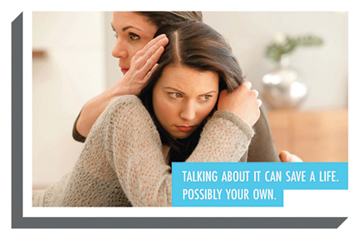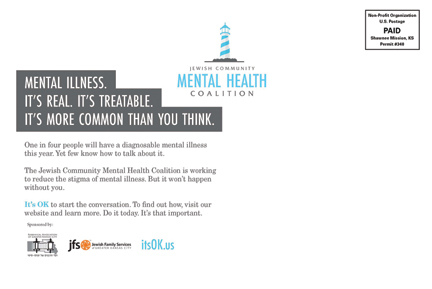 Years ago people didn’t say the word pregnant, or talk about people with cancer or AIDS. That’s all different now. But people are still afraid to talk about mental illness. The Jewish Community Mental Health Coalition wants to change that.
Years ago people didn’t say the word pregnant, or talk about people with cancer or AIDS. That’s all different now. But people are still afraid to talk about mental illness. The Jewish Community Mental Health Coalition wants to change that.
The Jewish Community Mental Health Coalition — which is comprised of approximately 30 volunteers and coordinated by Jewish Family Services in partnership with the Rabbinical Association of Greater Kansas City — is launching an Anti-Stigma Campaign at the High Holidays. The key message of the effort is: “Mental Illness: It’s real. It’s common. It’s treatable. And it’s OK to talk about it.”
The campaign will consist of post cards, posters, videos, a website (itsOK.us) and communitywide education aimed at reducing the stigma associated with mental illness. The campaign kicks off with post cards that should reach homes in the Jewish community on or around Rosh Hashanah.
Rabbi Scott White of Congregation Ohev Sholom, president of the Rabbinical Association, explained that this effort to reduce the stigma related to mental health issues comes from the simple fact that “the Jewish community is like every other community, not all people are in perfect mental health. Some people’s mental health and circumstances push them to contemplate and even commit tragic acts. We want to be able to maximize our community resources to prevent that.”
The coalition was formed about three years ago by some concerned members of the community who in one way or another had personally dealt with the impact of mental illness.
“They came to JFS with the concern that they weren’t really getting the kind of support they wanted and needed from the Jewish community,” explained Celeste Aronoff, JFS’s communications director.
“In a time of real loss, in a time of real struggle they felt isolated. They felt like there was no real compassionate help in the way they were expecting, and they wanted something to change,” she continued.
Aronoff said this campaign will give clear insight and direction on how to start and continue the conversation, even when it’s awkward or uncomfortable, and to open the discussion beyond stereotypes.
“The day-to-day reality for most people with a mental illness is that it’s real, it’s common and it’s treatable. Since thoughts and feelings are invisible, we may not be able to see when others are struggling. But acknowledging that struggle creates conversation with human dignity, kvod habriot, which is central to Jewish thought and ethics. By placing dignity at the center of the conversation around mental illness, we can only improve our lives and our community.”
Since the Jewish Community Mental Health Coalition was created, the individuals involved have tried to determine the best ways to address this issue. The coalition now has three main goals:
• Reduce the stigma of mental illness in the Jewish Community.
• Provide better access to resources prevent suicide.
• Provide a place for people to go in the Jewish community for grief support that includes spiritual support.
Goal No. 3, reducing the stigma around mental illness, is the genesis of this new campaign.
“In an emotionally charged way a lot of people had experienced that their friends just didn’t know what to say them, they didn’t know how to talk about it, they didn’t know how to offer support,” Aronoff said.
She pointed out that statistics show that mental illness is prevalent in America. In fact the U.S. Surgeon General reports that one in four people are diagnosed with a mental disorder of some kind each year. According to the National Institutes of Mental Health, “Mental illnesses are very common; in fact, they are more common than cancer, diabetes or heart disease.”
Rabbi White said this effort is important to the rabbinical community because part of the answer is to identify the elephant in the room.
“Our job as congregational leaders is to open the subject in the congregation and make people feel comfortable in participating in a situation that they might otherwise not know how to handle or know if it is appropriate,” Rabbi White explained.
In fact Rabbi White will discuss this topic during the High Holidays and he hopes his colleagues will do the same.”
It took a while to get this campaign rolling, JFS Executive Director and CEO Don Goldman noted, partly because they “expected to go out and find something like this and make slight changes so we could roll it out to our community. But that didn’t exist.”
Aronoff said there is plenty of information out there about mental health issues and much of it is now included on the itsOK.us website. However there was nothing already designed that could be distributed throughout the community or connected with specific educational components.
“We’re creating an entire educational piece around this,” Aronoff said. The educational campaign will be launched soon after the holidays with a big event. After that smaller events will be scheduled on a regular basis.
The post cards and website
 The postcards being mailed to members of the community each begin, Aronoff said, with what they hope is a captivating image and an intriguing message.
The postcards being mailed to members of the community each begin, Aronoff said, with what they hope is a captivating image and an intriguing message.
One such message appearing on the post card’s front side is “Talking about it can save a life. Possibly your own.” The flip side contains a more expanded message such as “Mental illness. It’s real. It’s treatable. It’s more common than you think.” All the messages end with “It’s OK to start the conversation.”
That is followed by the logos of the partnering agencies and the website.
Goldman said the whole point of the postcards is to redirect interested parties to the website.
“The message is to raise the awareness itself by the message and then the second point is to direct you to the website where you can get more involved and learn a little about what it really means to start the conversation, how you do that and how you deal with things that people think of as awkward,” he said.
Aronoff said the website also gives people access to a variety of resources.
“It’s OK that it’s awkward and uncomfortable and you don’t necessarily know what to say. But if you care you can start the conversation,” she said. “These suggestions don’t magically fix the problem or take away anything that the individual is dealing with, but it opens up a conversation and creates a bridge between people. It helps just being able to access the normal support of friends and family.”
The website will eventually include digital interviews from local community members who have agreed to discuss their experiences. The interviews will also offer such helpful information as what these people wish others would have said to them when they were in the middle of these situations.
Goldman and Aronoff point out it’s very important to note that the website is not for people in crisis.
“It is a start the conversation website. People in crisis or threatening suicide need to contact the suicide prevention hotline or be taken to an emergency room. This is not a substitute for seeking professional help for mental health issues in any way,” Aronoff said.
Locally designed
The campaign was designed locally with the help of JFS summer intern Rabbi Josh Dredze MSW from Yeshiva University. Goldman said the message being disseminated through this campaign was gathered through surveys as well as meetings with mental health professionals such as psychiatrists, psychologists, research professionals and volunteers.
This campaign would not be possible without the help of Bernstein-Rein, an independent marketing and communications firm that donated all its services to turn the message into a media campaign with marketing pieces for print, video and the website.
Aronoff explained the campaign was designed with modular components so that it would be easy to add additional partners down the road, noting that several organizations in the community have already expressed an interest in joining the coalition. This way it is also easy to share the campaign with other organizations who may want to tailor it to their needs.
The lighthouse logo the coalition uses specifically doesn’t incorporate anything from JFS or the Rabbinical Association. Aronoff said that is because organizers wanted the campaign to stand alone as its own entity.
“A lighthouse offers guidance and hope,” Aronoff said. Because those facing issues related to mental illness often feel like they are in darkness or navigating rough waters, “the message of this campaign is a beacon of light and hope in the middle of that.”
For more information on the Anti-Stigma Campaign and the work of the Jewish Community Mental Health Coalition, contact Aronoff at 913-327-8250.



